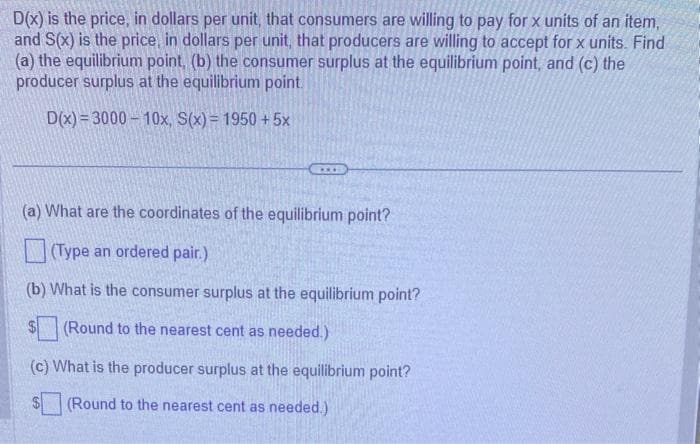D(x) is the price, in dollars per unit, that consumers are willing to pay for x units of an item, and S(x) is the price, in dollars per unit, that producers are willing to accept for x units. Find (a) the equilibrium point, (b) the consumer surplus at the equilibrium point, and (c) the producer surplus at the equilibrium point. D(x)=3000-10x, S(x) = 1950 +5x *** (a) What are the coordinates of the equilibrium point? (Type an ordered pair.). (b) What is the consumer surplus at the equilibrium point? (Round to the nearest cent as needed.) (c) What is the producer surplus at the equilibrium point? (Round to the nearest cent as needed.)
D(x) is the price, in dollars per unit, that consumers are willing to pay for x units of an item, and S(x) is the price, in dollars per unit, that producers are willing to accept for x units. Find (a) the equilibrium point, (b) the consumer surplus at the equilibrium point, and (c) the producer surplus at the equilibrium point. D(x)=3000-10x, S(x) = 1950 +5x *** (a) What are the coordinates of the equilibrium point? (Type an ordered pair.). (b) What is the consumer surplus at the equilibrium point? (Round to the nearest cent as needed.) (c) What is the producer surplus at the equilibrium point? (Round to the nearest cent as needed.)
Advanced Engineering Mathematics
10th Edition
ISBN:9780470458365
Author:Erwin Kreyszig
Publisher:Erwin Kreyszig
Chapter2: Second-order Linear Odes
Section: Chapter Questions
Problem 1RQ
Related questions
Question
Plz Attempt only if you can solve all parts correctly in clear handwriting asap I'll upvote your answer

Transcribed Image Text:D(x) is the price, in dollars per unit, that consumers are willing to pay for x units of an item,
and S(x) is the price, in dollars per unit, that producers are willing to accept for x units. Find
(a) the equilibrium point, (b) the consumer surplus at the equilibrium point, and (c) the
producer surplus at the equilibrium point.
D(x)=3000-10x, S(x) = 1950 +5x
***
(a) What are the coordinates of the equilibrium point?
(Type an ordered pair.)
(b) What is the consumer surplus at the equilibrium point?
(Round to the nearest cent as needed.)
(c) What is the producer surplus at the equilibrium point?
(Round to the nearest cent as needed.)
Expert Solution
This question has been solved!
Explore an expertly crafted, step-by-step solution for a thorough understanding of key concepts.
This is a popular solution!
Trending now
This is a popular solution!
Step by step
Solved in 2 steps

Recommended textbooks for you

Advanced Engineering Mathematics
Advanced Math
ISBN:
9780470458365
Author:
Erwin Kreyszig
Publisher:
Wiley, John & Sons, Incorporated

Numerical Methods for Engineers
Advanced Math
ISBN:
9780073397924
Author:
Steven C. Chapra Dr., Raymond P. Canale
Publisher:
McGraw-Hill Education

Introductory Mathematics for Engineering Applicat…
Advanced Math
ISBN:
9781118141809
Author:
Nathan Klingbeil
Publisher:
WILEY

Advanced Engineering Mathematics
Advanced Math
ISBN:
9780470458365
Author:
Erwin Kreyszig
Publisher:
Wiley, John & Sons, Incorporated

Numerical Methods for Engineers
Advanced Math
ISBN:
9780073397924
Author:
Steven C. Chapra Dr., Raymond P. Canale
Publisher:
McGraw-Hill Education

Introductory Mathematics for Engineering Applicat…
Advanced Math
ISBN:
9781118141809
Author:
Nathan Klingbeil
Publisher:
WILEY

Mathematics For Machine Technology
Advanced Math
ISBN:
9781337798310
Author:
Peterson, John.
Publisher:
Cengage Learning,

